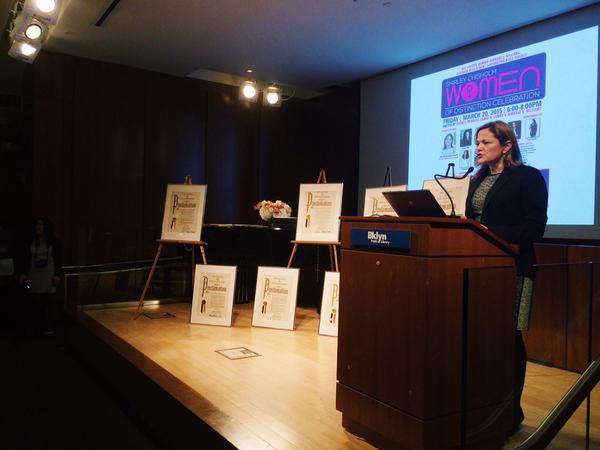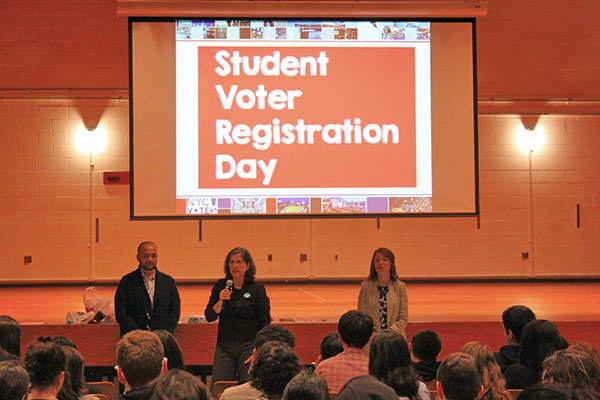
New York City Hall
What to watch for this week in New York politics:
We're getting close to the state budget deadline of April 1. This week will be full of both private negotiations and public sessions in Albany, where lawmakers attempt to come to a budget deal while showing significantly divergent takes on key issues - as well as central mechanisms related to the budget and policy. Governor Andrew Cuomo has jammed quite a bit of policy into his budget, attaching initiatives to appropriations in an attempt to strong-arm the Legislature into agreeing to his policy demands. This is especially true around ethics and educaiton reforms, but Cuomo has also used creative tactics to push compromise, tying an education tax credit favored by Republicans to the DREAM Act, which is favored by Democrats, for example. The Legislature is in session Monday through Thursday again this week.
Meanwhile, New York City officials await decisions in Albany (while also trying to affect those decisions, of course) and carry on their own budget work. The City Council will wrap up its month of preliminary budget hearings this week and then formulate a formal response to the mayor, who will then issue his Executive Budget in April, leading to another round of council hearings and a final budget deal by July 1. The City is eagerly awaiting word from Albany on things like funding for schools, homelessness prevention, public housing, and much more.
De Blasio is in Boston on Sunday and Monday, participating in the U.S. Conference of Mayors Cities of Opportunity Task Force Summit; on Monday, "there will be a press conference on transportation issues at 12:30pm" at Faneuil Hall; he'll return to New York City on Monday evening. De Blasio was in Albany on Saturday for the Somos el Futuro Conference, where he reiterated his push for full education funding from the State and other top priorities, and received "the Champion for Latinos Award at the dinner gala."
And the whole week builds to the annual Inner Circle Show this Friday (dress rehearsal) and Saturday, at which the press will roast the mayor, and vice versa.
There's plenty happening this week. See our day-by-day rundown below for more.
***Do you have events or topics for us to include in an upcoming Week Ahead in New York Politics?
E-mail Gotham Gazette editor Ben Max: This email address is being protected from spambots. You need JavaScript enabled to view it.***
The run of the week in detail:
Monday
Monday morning, schools Chancellor Carmen Fariña will visit a "CTE program to make an announcement" at the Thomas A. Edison Career and Technical Education High School in Queens.
Comptroller Scott Stringer's only public event scheduled for Monday is an 8:15 a.m. appearance on "Buen Día New York," WADO 1280 AM.
Also Monday morning, the Downtown-Lower Manhattan Association will host a breakfast with United States Senator Charles Schumer at Securities Industry and Financial Markets Association’s headquarters.
At 10:30 Monday morning, Manhattan Borough President Gale Brewer "will issue a report, Small Business, Big Impact: Expanding Opportunity for Manhattan's Storefronters, with case studies and policy recommendations to help small businesses grow and thrive in New York City." At The Halal Guys on the Upper West Side, Brewer will be joined by Robert Cornegy, Chair, New York City Council Small Business Committee; The Halal Guys co-founders Muhammed Abouelenein, Ahmed Elsaka, and Abdelbaset Elsayed; and Noel Hidalgo, Executive Director, BetaNYC. The report's recommendations include "Take the pressure off lease renewals"; "Overhaul regulations and city policies governing street vending" and "Help established, successful small businesses threatened by rent increases by encouraging "condo-ization" of storefront space." [Read our recent report on key issues facing small business in New York City and the City's new efforts to help ease regulatory burdens]
On Monday’s Brian Lehrer Show on WNYC, three of the five borough presidents will appear together: “Queens Borough President Melinda Katz, Bronx Borough President Ruben Diaz, Jr and Brooklyn Borough President Eric Adams talk about borough and city-wide issues facing Queens, Brooklyn and Bronx residents.
Monday at 10 a.m. at City Hall, preceding the relevant City Council preliminary budget hearing, "hundreds of New York City seniors and service providers were invited to descend upon City Hall's Council Chambers and make their voices heard at the Department for the Aging budget hearing to advocate for $33 million in critical funding for senior services."
At 11 a.m. on Monday at City Hall, Rep. Nydia Velázquez and other local leaders will release a report on how the Republican congressional budget would impact New York City: “From transportation, to housing, to health and human services, New York would be acutely affected by proposed cuts,” says a media advisory on the event.
At noon at City Hall, there will be a "Rally for action by Earth Day on plastic bag reduction bill" hosted by Council Members Brad Lander and Margaret Chin, who sponsor the relevant bill, and Council Member and Sanitation Committee Chair Antonio Reynoso, as well as other elected officials: "The bill (Int. 209) will reduce disposable bag use by requiring retail and grocery stores to charge 10 cents per single-use plastic or paper bag. Supporters of the bill turned out in large numbers at a public hearing before the Council's Sanitation Committee last fall, and will rally again for its passage by Earth Day (April 22)."
Monday’s City Council schedule consists of two preliminary budget hearings: a meeting of the Committee on Aging jointly with the Subcommittee on Senior Centers; and a meeting of the Committee on Health.
CUNY Journalism School's brown bag lunch series continues on Monday with a conversation between Errol Louis and Tom Robbins, both journalists and CUNY J-school professors. "Tom Robbins, investigative journalist in residence at the CUNY Graduate School of Journalism, will discuss his recent piece on the brutal beatings of former Attica Prison inmate George Williams...Errol Louis, director of the Urban Reporting Program and host of NY1's Inside City Hall, will pick Robbins' brain on the work that went into the nine-month project, as well as the larger issues of prison violence that it illuminated."
At 2 p.m. Monday, outside FDNY headquarters at MetroTech Center, Brooklyn BP Adams "will announce a borough-wide fire safety education campaign, following a fatal fire Saturday in Midwood that claimed the lives of seven siblings, aged five to 16, from the Sassoon family. His effort will include multilingual outreach and the distribution of free smoke detectors...Adams will call for the creation of a burn center in Brooklyn...Adams will be joined by local elected officials and Jewish leaders."
Also Monday, in Albany, Citizen Action of New York will hold Moral Monday to Raise the Wage: “Nearly 3 million workers – 37% of New York’s workforce – earn less than $15 an hour. Thirty-six percent of adults earn less than $15 an hour; 41% women earn less than $15 an hour, and 28% of workers with at least some college education earn less than $15 an hour. A full-time worker earning $9 an hour will bring home just $18,720 per year – still below the federal poverty line for a family of three. Under the Self-Sufficiency Standard guidelines, a more accurate measure of the cost of living in New York, the hourly wage that 2 full-time workers must each earn to meet basic budget needs ranges from $13.40 in Schenectady County, to $16.15 in New York City, to $20.73 in Suffolk County.”
Monday at noon, there will be meeting of the New York State Gaming Commission at the New York State Department of Labor.
Monday afternoon in Albany, the Senate Standing Committee on Corporations, Authorities and Commissions will hold a hearing to consider several pieces of legislation.
Monday evening, “The Middle Class Action Project will host a candidates forum with Republican District Attorney Daniel Donovan and Democratic Councilman Vincent Gentile to discuss economic issues facing the middle class,” according to the Staten Island Advance.
Tuesday
Tuesday morning, the New York Bar Association will host Campaign Finance: The Current State of Affairs and Where We Go From Here: “Since the Supreme Court's 2010 decision in Citizens United, campaign finance law has moved at a rapid pace, leading the way for the creation of various entities that facilitate the injection of billions of dollars into elections. And Congress just increased the power of political party committees by significantly increasing applicable campaign finance limits. This program will consist of three panels composed of top-tier campaign finance law experts, regulators, reporters and political consultants.” Panelists will include Nicholas Confessore from The New York Times; Dave Levinthal from the Center for Public Integrity; Eric Friedman from NYC Campaign Finance Board; Bill Hyers from Hilltop Public Solutions; Fritz Schwarz, Jr. from the Brennan Center; Douglas Kellner from the NYS Board of Elections; and Jerry Goldfeder from Stroock & Stroock & Lavan.
Tuesday’s City Council schedule will include a meeting of the Committee on Fire and Criminal Justice Services for a preliminary budget hearing; a meeting of the Committee on Zoning and Franchises to review proposed Land Use Applications; and a meeting of the Subcommittee on Planning, Dispositions and Concessions to review land use applications.
Tuesday morning in Albany, the Senate Standing Committee on Environmental Conservation will hold a hearing to consider a variety of bills to amend the environmental conservation law; the Senate Standing Committee on Transportation will meet to consider several bills amending the highway law and the vehicle and traffic law; the Senate Standing Committee on Judiciary will meet to discuss the reappointments of several judges at the New York Court of Claims; and in the afternoon, the Senate Standing Committee on Codes will meet to discuss a series of act to amend the civil rights law and the penal law.
Tuesday evening, the YWCA will host its Women's History Month Reception 2015. The theme of this year's series of events is Leadership and Generosity: A Call to Action; and as it culminates on Tuesday, the YWCA is honoring Public Advocate Letitia James as "YW Woman of the Year" for her hard work toward gender and racial equity for women and girls. [Read our new profile of PA James as a recent history-maker, the first woman of color elected to city-wide office]
Tuesday evening, City Council Member Andy King and his staff will be hosting one in a series of Constituent Services Nights in different NYCHA housing developments. The program will include resources and solutions for housing, food stamps, immigration, Access-A-Ride and more.
Tuesday evening, Parsons DESIS Lab and Lower Manhattan HQ will host Public Space: New Ideas for Civic Life: “New York City has an abundance of public spaces rich in culture and design, from Central Park to the New York Public Library. However, despite these places’ role as the physical center of civic life, digital platforms have emerged as the preferred way for government to engage the public. How can we revitalize public spaces as places to enhance civic life and public participation in government?” Speakers will include Mary Rowe of Municipal Arts Society and Victoria Milne of the city's Department of Design and Construction.
Also Tuesday evening, Columbia School of International and Public Affairs presents Public Policy Challenges: Women’s Empowerment in NYC: “Come learn from and engage with leading practitioners on New York law, policy, and services related to violence against women.” The panel will include Ana Oliveira, President and CEO of the New York Women's Foundation; Rose Pierre-Louis, Commissioner of the NYC Mayor's Office to Combat Domestic Violence; and Maria Torres-Springer, Commissioner of the NYC Department of Small Business Services.
Wednesday
Wednesday’s City Council schedule will include two preliminary budget hearings: a meeting of the Committee on Education and a meeting of the Committee on Sanitation and Solid Waste Management.
Wednesday morning in Albany, the Senate Standing Committee on Social Services will meet to discuss a variety of potential amendments to the social services law.
Wednesday at noon, the New York State Bar Association will host Human Trafficking in New York State: Legal Issues and Advocating for the Victim, “to educate attorneys across the country on how to identify potential victims of human trafficking.” [Read Manhattan DA Cy Vance's recent op-ed on the need to strengthen sex trafficking laws in New York]
Wednesday evening, the city's Panel on Educational Policy (PEP) will host a public meeting at Murry Bergtraum High School in Manhattan.
Also Wednesday, at 6:30 p.m., the Digital NYC Five Borough Tour will hit Queens. Panelists will include Kristin Hodgson, Communications Director at Meetup, and Jukay Hsu, Founder of Coalition for Queens.
Thursday
Thursday morning at Fordham University Lincoln Center Campus, “All alumni are invited to join us for the inaugural interview session and breakfast for the new Oral Archive on Governance in New York City: The Bloomberg Years” featuring Howard Wolfson, former Deputy Mayor for Government Affairs and Communications.
Thursday’s City Council schedule will include a meeting of the Committee on Public Housing for a preliminary budget hearing; a joint meeting of the Committee on Small Business and the Committee on Economic Development for a preliminary budget hearing; and a meeting of the Committee on Land Use to review all items reported out of the Subcommittee hearings.
Thursday evening, “Join us at Civic Hall – the new beautiful co-working space for civic tech and VRL’s new NY home! – for an evening of workshops and an engaging panel of women leaders.” The event is hosted by VoteRunLead, Veracity Media, Civic Hall, Republican Majority for Choice, Women's Information Network NYC (WIN NYC), She Should Run, Emerge America, Rising Stars and Greater NYC for Change.
Thursday at 5:30 p.m., CUNY Institute for Educational Policy at Roosevelt House will host Challenging the Tenure Laws in New York State: Why or Why Not?: “Davids vs. New York, a highly publicized lawsuit challenging New York's teacher tenure and seniority laws, is underway. Plaintiffs contend that the current laws violate children's constitutional right to a sound, basic education by keeping ineffective teachers in classrooms; defendants claim the lawsuit is a spurious attempt to destroy hard-won protections for the state's teaching profession.”
Thursday evening, Council Speaker Mark-Viverito and members of the Council's Irish caucus - Council Members Danny Dromm, Corey Johnson, Liz Crowley, and Jimmy Van Bramer - along with other council members, will host the Council's Irish Heritage and Culture celebration at City Hall.
Also Thursday evening, City Council Members Donovan Richards and Member Daneek Miller, and the Mayor’s Office for Immigrant Affairs will host an IDNYC Community Meeting in Queens.
Thursday at 6 p.m., City and State will host Above and Beyond: Honoring Women of Public and Civic Mind: “Each year, City & State honors 25 women who exhibit exceptional leadership in their fields and have made important contributions to society."
Friday and the weekend
Friday at City Hall, the Committee on Contracts, the Committee on Courts and Legal Services, the Committee on Community Development and the Committee on Youth Services will all hold preliminary budget oversight hearings throughout the day.
Friday afternoon, in celebration of Women’s History Month, City Council Member Elizabeth Crowley will host a special film screening of a documentary on Geraldine Ferraro’s life titled “Geraldine Ferraro: Paving the Way,” the film about the life of the first female Vice Presidential nominee of a major political party.
Friday evening, Brooklyn Borough President Eric Adams, Councilwoman Laurie Cumbo, Assemblywoman Jo Anne Simon, District Leader Shirley Patterson and Green Earth Poets Café will host Shirley Chisholm Women of Excellence Awards and Reception: “Brooklynite Shirley Chisholm was a catalyst of change who made history by becoming the first African-American woman elected to Congress. Because of her values Barack Obama became the first African-American President in 2008. Senator Hamilton will continue her legacy by recognizing the achievements of iconic Brooklyn women on Friday, March 27th at the historic First Baptist Church in Crown Heights.”
Friday evening, the Inner Circle Show will hold its rehearsal; with the main event on Saturday night, both at the New York Hilton Hotel.
On Saturday at noon, Zephyr Teachout and others are holding a rally: "Gov. Cuomo has turned his back on our students. Join us as we rally outside his Midtown Office to demand that he fully fund our public schools, support struggling schools, not raise the cap on charter schools, and limit high-stakes testing!"
***
Have events or topics for us to include in an upcoming Week Ahead in New York Politics? E-mail Gotham Gazette executive editor Ben Max any time: This email address is being protected from spambots. You need JavaScript enabled to view it. (please use "For Week Ahead" as email subject).
***
by Rati Mukhuradze, Marco Poggio, and Ben Max
@GothamGazette

















